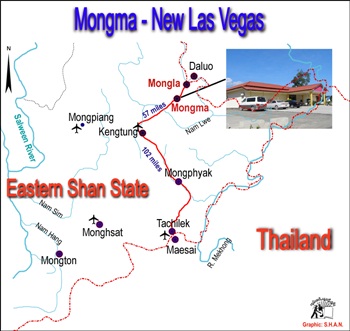The National Democratic Alliance Army (NDAA) based in Mongla on the Sino-Burmese border, like its ally the United Wa State Army (UWSA), is known as a former armed unit of the Communist Party of Burma (CPB) that is mostly engaged in commercial activities to enrich itself and its top members.
 But since 1 May, 102 of its leading members have been attending refresher course on politics and leadership, which will last until 25 May.
But since 1 May, 102 of its leading members have been attending refresher course on politics and leadership, which will last until 25 May.
“Sao Sai Leun (NDAA leader) says the world is changing and the country is changing,” said a member who came to receive the Restoration Council of Shan State / Shan State Army (RCSS/SSA) delegation led by Sao Yawdserk on Sunday, 20 May. “And that we need to be in tune with the change so we will not be left behind.”
The instructors include 2 invited academics from China.
Mongla is also having its government operated high school reopened by the end of the month. “We had 170 students after the ceasefire agreement was renewed in September,” said Daw Aye Tun, a Palaung from Namhsan, the capital of the Palaung Self Administered Zone, formerly the seat of the ruling princes of Tawngpeng. “We are expecting more for the coming new academic year.”
Apart from herself, there are 25 teachers (3 males, 22 females).
Reports that during the past 20 year (1989-2009) period of ceasefire the schools in Wa and Mongla areas had not been able to produce a single student who finished even primary school, were dismissed by Col Aung Thu, Minister for Security and Border Affairs, Shan State Government. “There are several who finished school here and went on to study further (outside the territory),” he said. “Some of them are back to work with the Natala (Border Areas and National Races Development Directorate) in Kengtung.”
The minister however conceded that most of the graduates had chosen to remain making a living in towns rather than returning to their home villages.
Mongla also has a hospital with one doctor, who also performs surgery, and 13 nurses, most of whom are ethnic Shans.
Asked what most of the local patients getting treatment at the hospital suffer from, the head nurse replied promptly, “On top is high blood pressure, followed by tuberculosis. Others are minor complaints, though we sometimes have AIDS patients too.”
Staying there less than 20 hours, SHAN had little time to find out much about the ordinary people’s life. “They eat better, drink a lot and smoke heavily,” said a young NDAA official, who claims and looks to be a non-alcoholic and non-smoker.
Sai Leun aka Lin Mingxian, 66, himself has already suffered two massive strokes during the past 10 years. He however appeared to be in good shape when SHAN met him last Sunday.
The NDAA area is wedged between China and Laos. It also enjoys access to Thailand and Cambodia through the Mekong that flows north to south on its eastern border. Its main revenues reportedly derive from casinos (more than 20), mining and tourism. The territory boast huge deposits of manganese and coal



